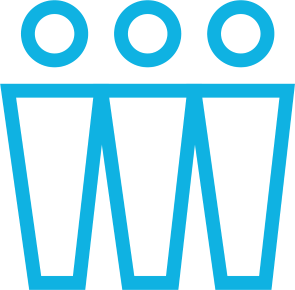Since 2010, the Georgia Public Service Commission has hosted discussions on alternative fuel and the automotive industry in Georgia. Founded by Commissioner Tim Echols, the original intent was a roundtable of industry experts gathered to discuss the challenges of introducing new technologies into fleets and other modes of transportation. Over the past thirteen years, the discussion grew into what is now called the Clean Energy Roadshow. Today, the Roadshow is a statewide series of energy seminars, ride, and drive opportunities, and is open to all professionals and government leaders.
Georgia Power Community and Economic Development was invited to present on supporting the efforts on building a workforce and talent pipeline around electric transportation.
Jamal Jessie and Nikia Johnson joined the shows and were excited to share highlights from their events in a recent interview.

33
EV Announcements Since 2018

29K+
Jobs Created
Jamal: Last month we had the opportunity to participate in the 13th Annual Clean Energy Alternative Fuel roadshow with Commissioner Tim Echols. After thirteen years of doing this, the industry has evolved, so there were a lot of electric vehicles and alternative vehicles for communities to learn about. We looked at the workforce availability for those types of industries. Georgia is now becoming a huge player in that market, an epicenter in the Southeast of Electric Vehicles.
The Clean Energy Roadshow is a great event to kind of showcase that across the community and how it can impact and help communities as well as businesses save money by potentially upgrading their fleets to alternative or electric vehicles that bring cost savings to the communities.
Nikia: While it was the 13th Annual Rd show that Commissioner Echols has hosted, it was my first time being a part of this event. It's a space where they bring in stakeholders that are related to electric transportation.
I was excited to share resources and provide updates on the work that's being done in this space, so all the stakeholders such as manufacturers, suppliers, and funding partners understand how we need to support those efforts as it relates to building the workforce around electric transportation.
Is there anything from the presentation deck you used at the event that really stood out to the audience, or some of the data you'd like to share here?
Jamal: The very the very first slide that has the geography of all electric manufacturers and the southeast was very impactful and got a lot of attention.
Not everyone realizes the large concentration of manufacturers of electric vehicles as well as battery manufacturers we have in Georgia, as well as the Southeast. So that was a huge hit with the audience.
Nikia: That was definitely a wow factor for the presentation, as well as the graphic about occupations, because a lot of times when we think about electric transportation, we only think about the vehicle itself or the batteries. Another thing that kind of got the attention of those in Savannah was not only are we looking at those type of occupations, but also from the IT space as well.
Jamal: One other thing that I'll add is that for each area location that we visit, we had a very specific graphic about their region. Referencing the number of projects that have coming to the region, as well as capital investment, so that was also very informative for the communities too, especially for people who don't work in economic development and may not have heard those numbers.
How do you see this industry going forward as we take on supporting the workforce for such a fast-growing sector in the state?
Jamal: There is growth as these automotive manufacturers come to the state, and more suppliers and battery manufacturers. So that opens more opportunities for jobs, and that requires new education pathways into those career fields. We must build those pathways to ensure that we can provide a skilled workforce to meet the demand.
Nikia: And just by creating this awareness around what's going on in the electric transportation space, I think it's a critical indicator that businesses and all of the stakeholders involved in this work will definitely need to be strategic in their partnerships with educational partners.
Again, to Jamal's point, to be able to build out that infrastructure to be sure that we have the workforce. It's amazing that we have all these businesses coming to Georgia, but we also need to make sure that we're building that ecosystem that will support the workforce for all of these industries that are coming here.
How is your team at Georgia Power helping to support that pipeline development?
Jamal: The biggest thing we're doing right now is really trying to create the awareness of the opportunities that are coming to our communities. We're working closely with our technical school partners. Most recently, you may have seen a lot of announcements from the Technical College System of Georgia (TCSG) starting EV pathways. So that's the first thing, making sure that we have programs in place to scale the workforce across the state.
Also taking it to K-12 education and pathways and working with some nonprofits that can do short term training programs for roles that don't require necessarily an associate's degree but some kind of verification training to get workers into those jobs.
Nikia: In addition to the to training, we're also a convener and a supporter, connecting those education partners to the resources that available. That pathway hasn't been released just yet, but we can still do work within the automotive pathways that currently exist in CTAE, as well as the advanced manufacturing pathways. And upskilling those students that would be interested in electric transportation.
Jamal: That's a great point about upskilling and rescaling the current workforce example, people are in automotive right now into electric vehicles is going to be a huge factor in us making sure that we have a workforce available for industry coming to the state. I'm excited for the state because nationally Georgia is being highlighted as you know the EV hub. We're excited as new investments and jobs come to the communities. It is going to mean economic growth, which means it's going to be better for all Georgians.
NIkia: And again, just giving them those options. Four-year college is not necessarily for everybody, but providing opportunities to show that there are other career paths for them, in addition to again bridging the gap between business and industry. That's what we're focusing on every day.
Economic Development Education
Jan 24, 2022


